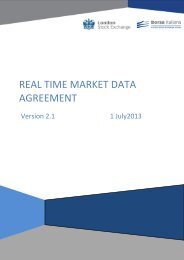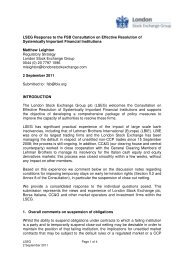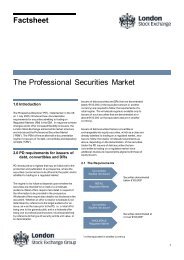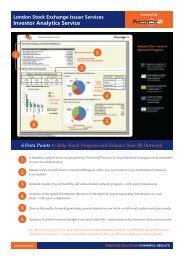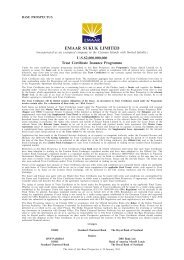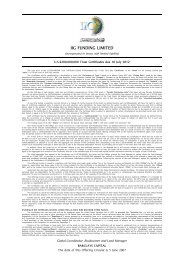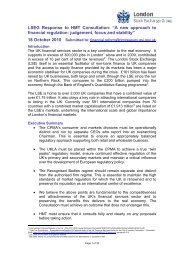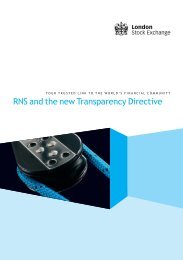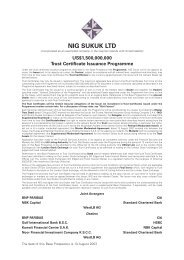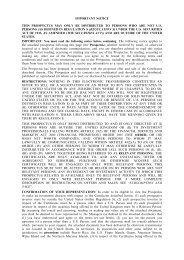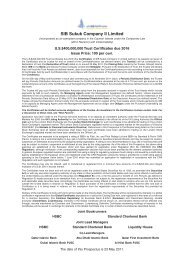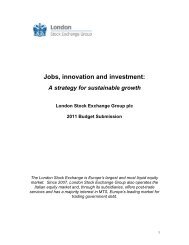LSEG Response to IOSCO Consultation - London Stock Exchange
LSEG Response to IOSCO Consultation - London Stock Exchange
LSEG Response to IOSCO Consultation - London Stock Exchange
You also want an ePaper? Increase the reach of your titles
YUMPU automatically turns print PDFs into web optimized ePapers that Google loves.
21 In practical terms, it is unlikely that in extreme market conditions marketmakers would continue <strong>to</strong> provide prices, regardless of the regula<strong>to</strong>ryrequirements upon them. The risk of a censure or a fine from an RM, MTF oreven a Competent Authority could seem less significant when set against thepotential risk of significant financial loss or insolvency from meeting manda<strong>to</strong>ryobligations <strong>to</strong> continue <strong>to</strong> quote prices in fast-moving and volatile markets whennot in their interests. The fine is likely <strong>to</strong> be a small price <strong>to</strong> pay for stepping ou<strong>to</strong>f the path of the oncoming train.22 Finally, we do not support the use of stub quotes. If market makers are able <strong>to</strong>be absent from the market for a period of time in periods of high volatility, andthose markets themselves use volatility controls, then stub quotes will be notbe necessary.Question 6 – Do you have suggestions for improvements <strong>to</strong> regula<strong>to</strong>rs’surveillance capabilities with respect <strong>to</strong> the markets and modern tradingtechniques? Please elaborate.Who should bear the cost of investing in such capabilities and the cost ofoperating and supervising the markets in order <strong>to</strong> ensure fairness amongmarket participants? Please elaborate.23 Trading venues have a role <strong>to</strong> play, as the front line regula<strong>to</strong>rs, in ensuring thattheir markets remain fair and orderly with real-time moni<strong>to</strong>ring and surveillance.We are aware that competent authorities may be considering enhancing theirsurveillance systems <strong>to</strong> have a real-time view of the markets. This is likely <strong>to</strong> becomplex and expensive <strong>to</strong> implement and may not necessarily be effective –especially across the larger fragmented equity markets in Europe, and acrossEU member states.24 A distinction should be drawn between market abuse, which is a criminal act,and market disruption or an activity having an impact on market integrity, whichcan be the result of erroneous orders and so called “fat finger” errors. MarketAbuse is difficult <strong>to</strong> detect and respond <strong>to</strong> in real-time; it often requiresextensive investigation after the event, using transaction data that can takeseveral weeks or even months <strong>to</strong> analyse. Market disruption can be detectedmore easily in real-time, and dealt with rapidly by trading venues in theircapacity of ensuring orderly and fair markets.25 Therefore, although real-time capabilities are required for trading venues <strong>to</strong>ensure orderly trading, we do not see that they would be required by regula<strong>to</strong>rs<strong>to</strong> moni<strong>to</strong>r for market abuse – certainly not for the cost that would be required<strong>to</strong> achieve such real-time surveillance in larger and fragmented equity marketssuch as the UK. In Europe, competent authorities already receive transactiondata at the end of the day, and may request further data from investment firmsand trading venues if they believe that a case of market abuse exists.Page 7 of 11



